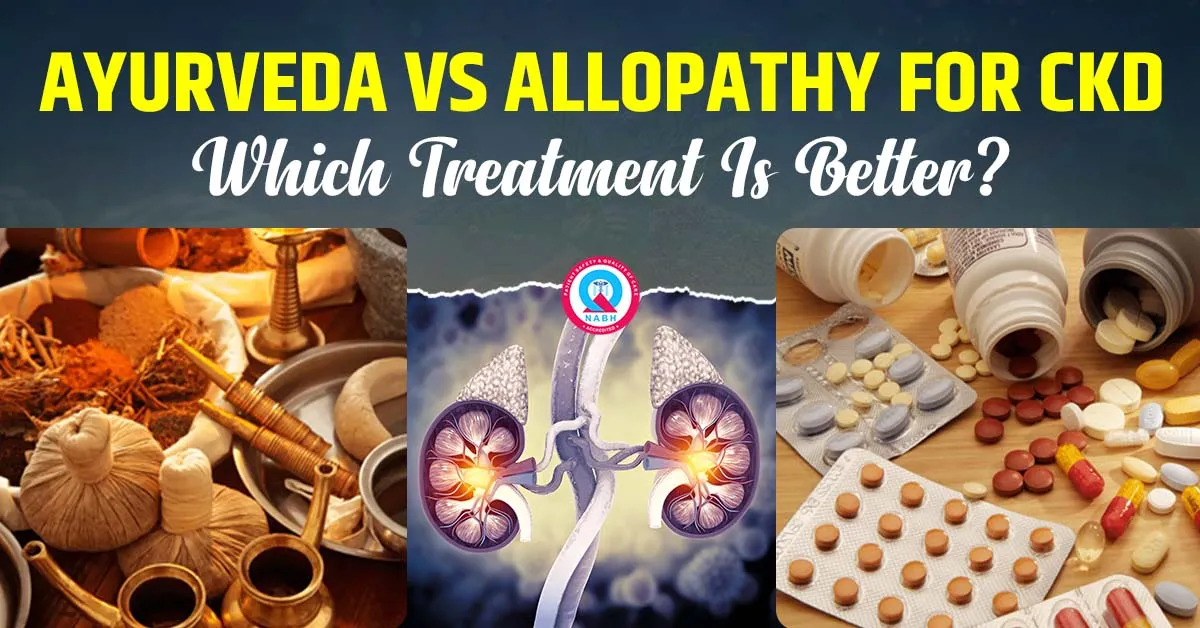
If you or someone you know has chronic kidney disease (CKD), you have likely asked the question: "What is better to treat with, Ayurvedic treatment for CKD or allopathy?" This is a legitimate question, and it can be tricky to answer. Both Ayurveda and allopathy have unique features and strengths, and understanding these strengths can assist you in your life choices about managing CKD.
Let's break it down into textiles in a straightforward and socially responsible manner.
Allopathy is what we often refer to as mainstream medicine. Allopathy entails doctors, hospitals, medications, surgery, and dialysis when there is advanced kidney disease. In this situation, the main purpose is to maintain life and control symptoms and slow the rate of kidney damage, while managing complications like high blood pressure and anemia.
Allopathy uses medicines that have been extensively tested and approved through clinical trials. For example, drugs to control blood pressure, reduce protein in urine, or manage blood sugar levels are commonly prescribed. In advanced stages, dialysis or a kidney transplant may be recommended.
The strength of allopathy lies in its evidence-based approach and its ability to provide immediate and often lifesaving interventions.
Ayurveda is an ancient Indian medicine system that aims to balance the body, mind, and spirit to encourage healing. In CKD, Ayurveda works to restore kidney function, improve digestion, remove excess toxins (ama), and help the body find equilibrium. Typical Ayurvedic treatment for CKD includes herbal medicines for CKD, dietary changes, lifestyle changes, and therapies based on, or in combination with, Panchakarma (detoxification treatments). Common Ayurvedic herbs known to support kidney health are Punarnava, Gokshura, and Varun.
The focus on the individual in Ayurveda is very refreshing - treatments can be centered on the individual's particular body constitution (Prakriti) and stage of disease. Ayurveda focuses on prevention and treating more than just symptoms, by working on root causes.
Here’s the truth: Neither Ayurveda nor allopathy is universally “better.” Instead, they can complement each other beautifully if used wisely.
In Early Stages of CKD: Natural CKD treatment can help improve kidney function, reduce inflammation, and support your body’s natural healing abilities. Alongside, allopathic medicines might be prescribed to control blood pressure or other conditions.
In Advanced CKD: Allopathy plays a crucial role, especially when dialysis or transplant is necessary. Ayurveda can still provide supportive care to improve the quality of life and reduce side effects.
Lifestyle and Diet: Both systems agree on the importance of diet, hydration, and lifestyle changes. Combining Ayurvedic dietary wisdom with allopathic recommendations can be very powerful.
Always Consult Qualified Practitioners: Whether you choose Ayurveda, allopathy, or both, it’s important to work with trained doctors who understand your condition deeply.
Avoid Self-Medicating: Especially with herbs or medicines, because some can interfere with allopathic drugs or affect kidney function adversely.
Communication is Key: If you are using both, make sure your Ayurvedic practitioner and allopathic doctor know about each other’s treatments to avoid conflicts.
Choosing between Ayurvedic CKD treatment and allopathy for CKD isn’t about picking sides. It’s about finding the right balance for your body, health goals, and stage of the disease. Many people find that integrating both approaches gives them the best chance to manage CKD effectively and live a better quality of life.
Kidney health is complex, but with careful guidance, a balanced approach, and mindful choices, you can navigate CKD with hope and strength.
If you want, I can help you learn more about how Ayurveda and allopathy can work together or suggest practical tips for CKD management. Just ask!
Second Floor, 77, Block C, Tarun Enclave, Pitampura, New Delhi, Delhi, 110034